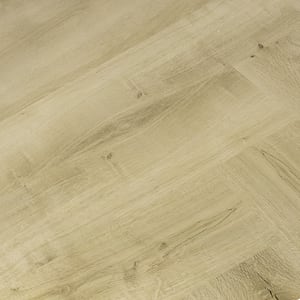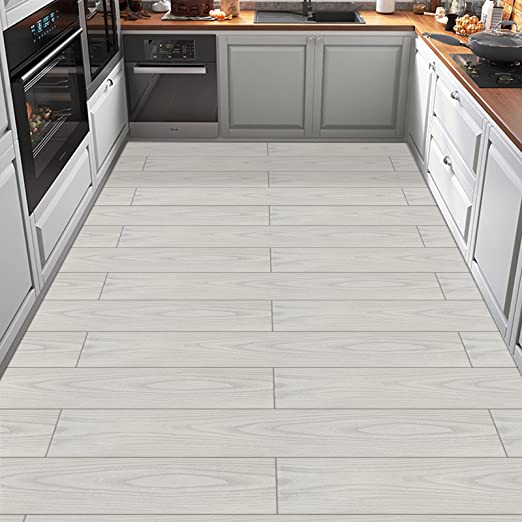Vinyl flooring – everything you need to know about buying, fitting and cleaning
This fabulous choice of flooring is great for adding personality to a space
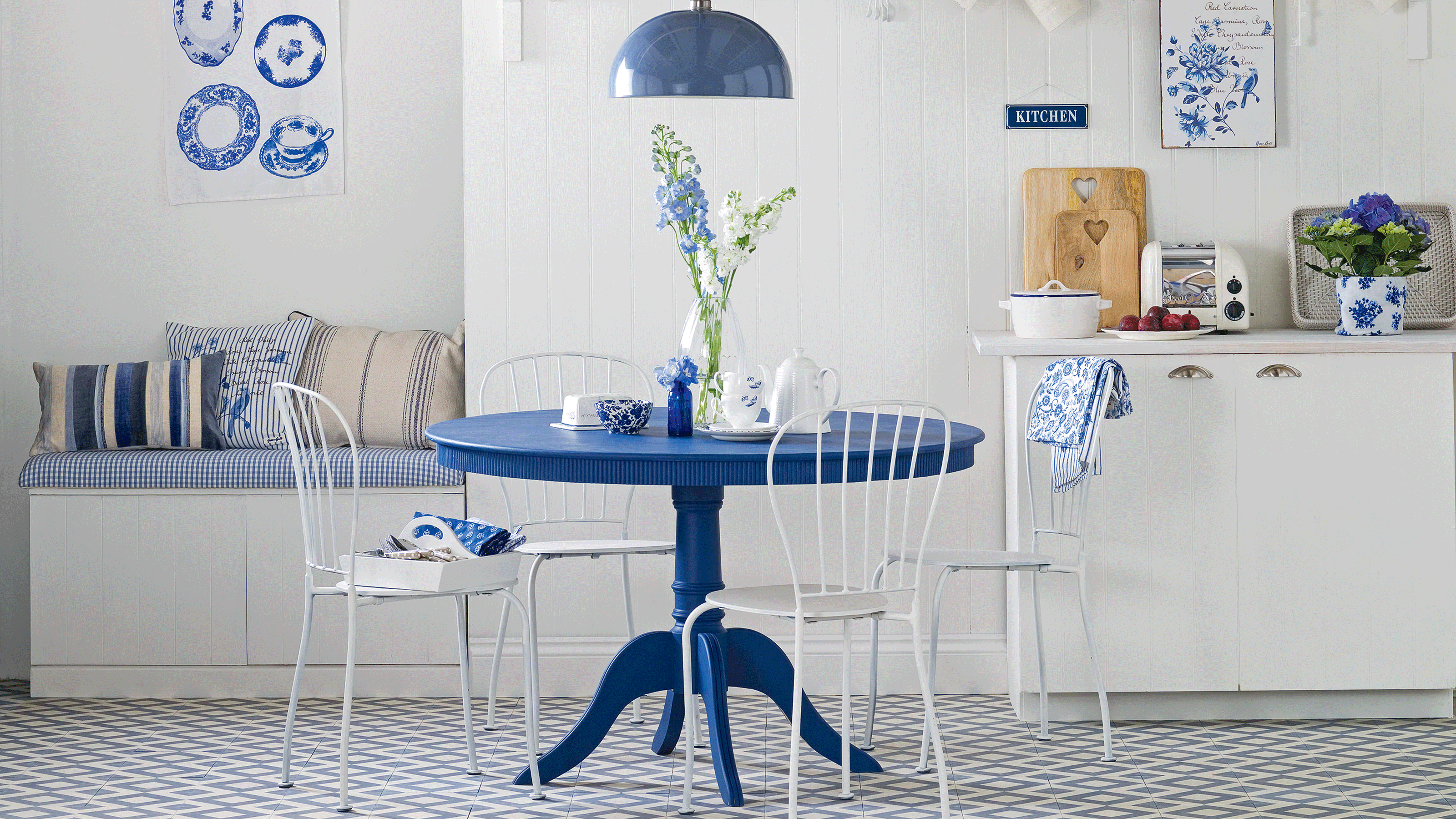

Katie Sims
Lots of people have been making the switch to vinyl flooring recently, whether in their kitchen, bathroom, or even their living room, and it's not hard to see why. There's so many fabulous modern vinyl designs that rival tile and wood but at a much lower price.
The best vinyl flooring is hard wearing, durable and easy to lay. It also boasts naturally waterproof materials, making it perfect for both kitchen flooring ideas and bathroom flooring ideas. It's also a lot softer and warmer underfoot compared to stone and ceramic tiles, more forgiving with dropped crockery and a breeze to keep clean. No wonder it's enjoying a resurgence in popularity.
But if you've got questions when it comes to vinyl flooring, you're not alone. Lots of us still don't know what exactly vinyl flooring is made from, and that's before we even think about where to buy it and how to install it. We've put together this essential guide which will tell you anything and everything about vinyl flooring.
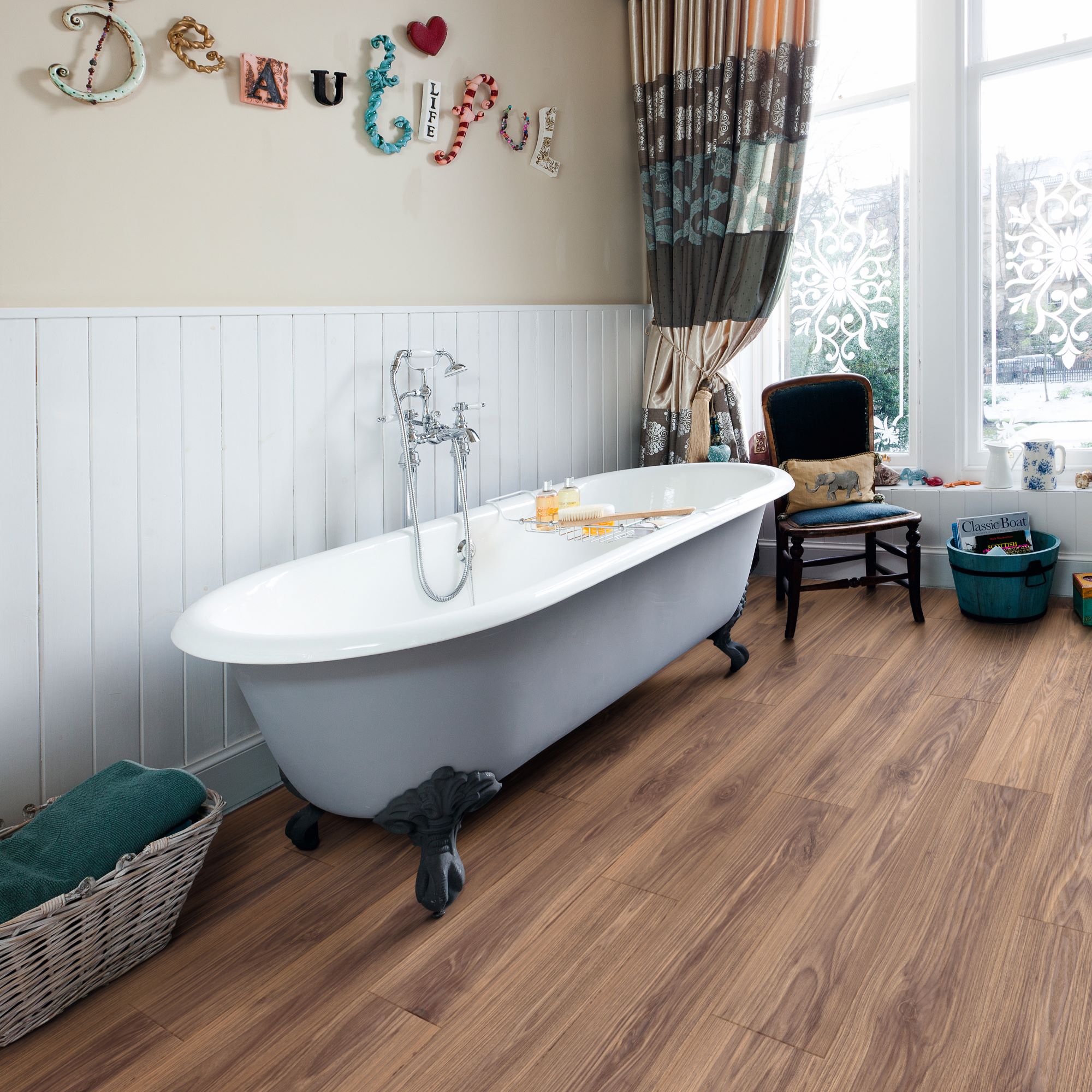
Vinyl flooring - everything you need to know
The flooring experts know what they're talking about when it comes to vinyl flooring, which is why we've compiled all their advice into this guide. We'll cover what material vinyl flooring is made from, whether you should be buying sheets or tiles, where to buy from, and how to keep it clean. There's even some pointers on how to install vinyl flooring yourself, so you'll be fully clued up after reading.
What is vinyl flooring made from?
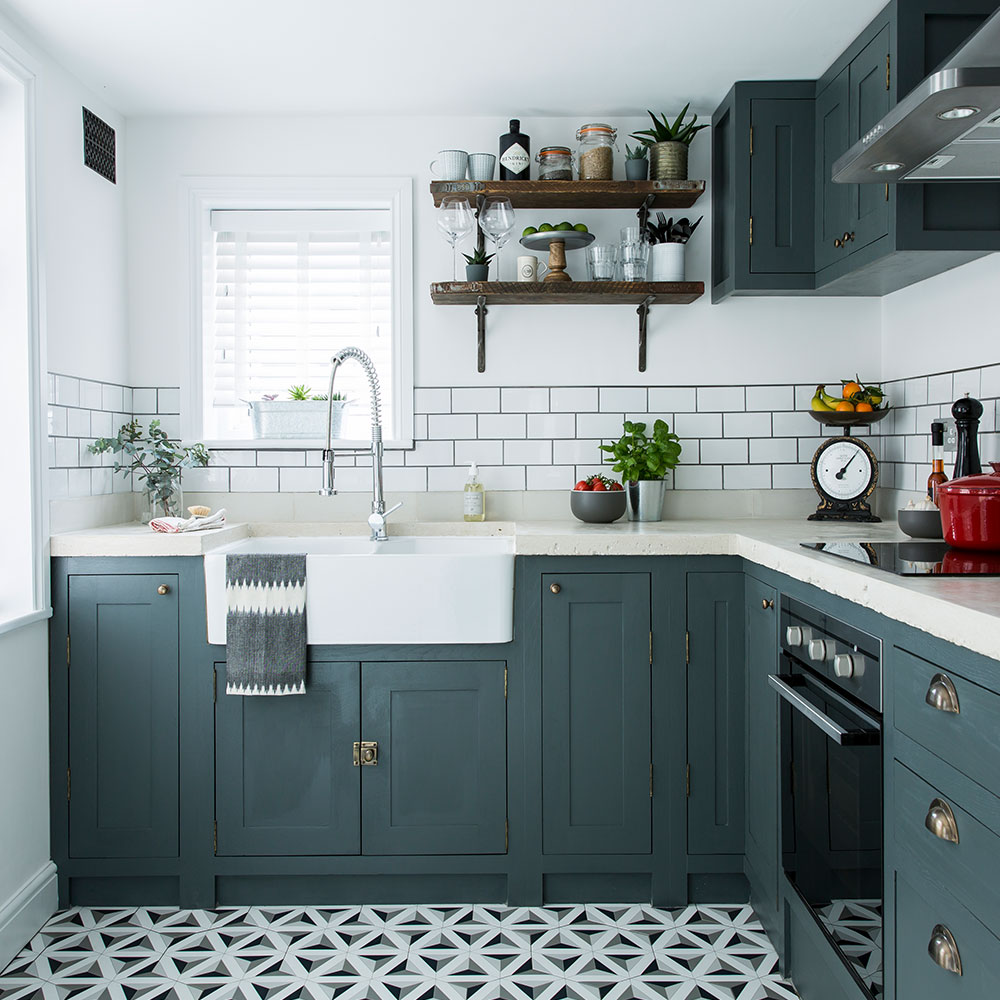
'Vinyl flooring is made primarily of the synthetic plastic PVC, or polyvinyl chloride,' explains Richard Mann, Founder, Premier Porcelain. 'It’s created from a combination of petroleum, ethylene, and chlorine, and it makes a very durable, flexible, and water-resistant material to make flooring with!'
The core material is polyvinyl chloride resin. Vinyl flooring once contained harmful volatile ingredients that, understandably, put homeowners off, but now it’s totally safe and can even be recycled.
Should I choose tiles or sheet vinyl?
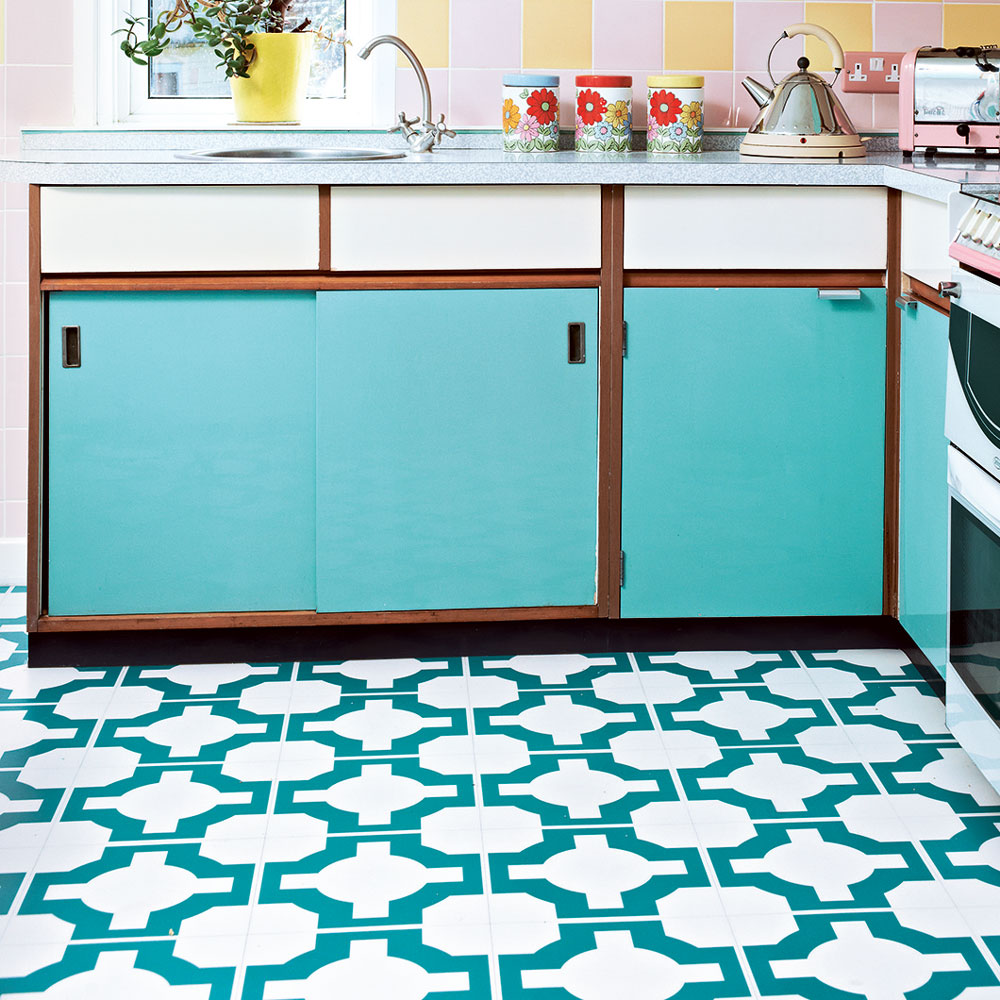
Sheet vinyl comes in one piece and tends to be cheaper, although the new breed of custom-printed sheet vinyl (try Zazous or Atrafloor) is costlier but worth it. Standard rolls come in 2-4m widths, so you may need to put up with a join in larger rooms.
Get the Ideal Home Newsletter
Sign up to our newsletter for style and decor inspiration, house makeovers, project advice and more.
Vinyl tiles (like the above) are rigid, and come in packs – some offer super-easy stick-on installation. Luxury vinyl tiles are the top-end option, costing from £40 per sq m. They offer excellent rigidity as well as insulation, sound absorption and work well with underfloor heating.
'Vinyl tiles are individual pieces - easy to install, and if damaged, simple to replace. Plus, they offer a variety of designs, sizes, and colors,' says Andhi Ermawan, Founder, MyProsAndCons.com. 'Sheet vinyl, on the other hand, is a one-piece roll, providing a seamless look for larger rooms. If you're concerned about moisture, sheet vinyl might be your best bet since it doesn't have seams for water to get through. Consider room size, how easy it is to install, and the look you want before deciding.'
How do I know a vinyl floor is good quality?
Thickness is a good indication of quality, for both sheet and tiled vinyl. Cheap sheet vinyl starts at 1.1mm thick, which will make it easy to fit but not very long-lasting. Aim for 3.5mm upwards.
'For extra piece of mind, seek out vinyl flooring that comes with a decent warranty,' advises Mark Findlay, Flooring Expert, Harvey Maria. 'At least 10 years, preferably more, is good.'
Where should I buy vinyl flooring?
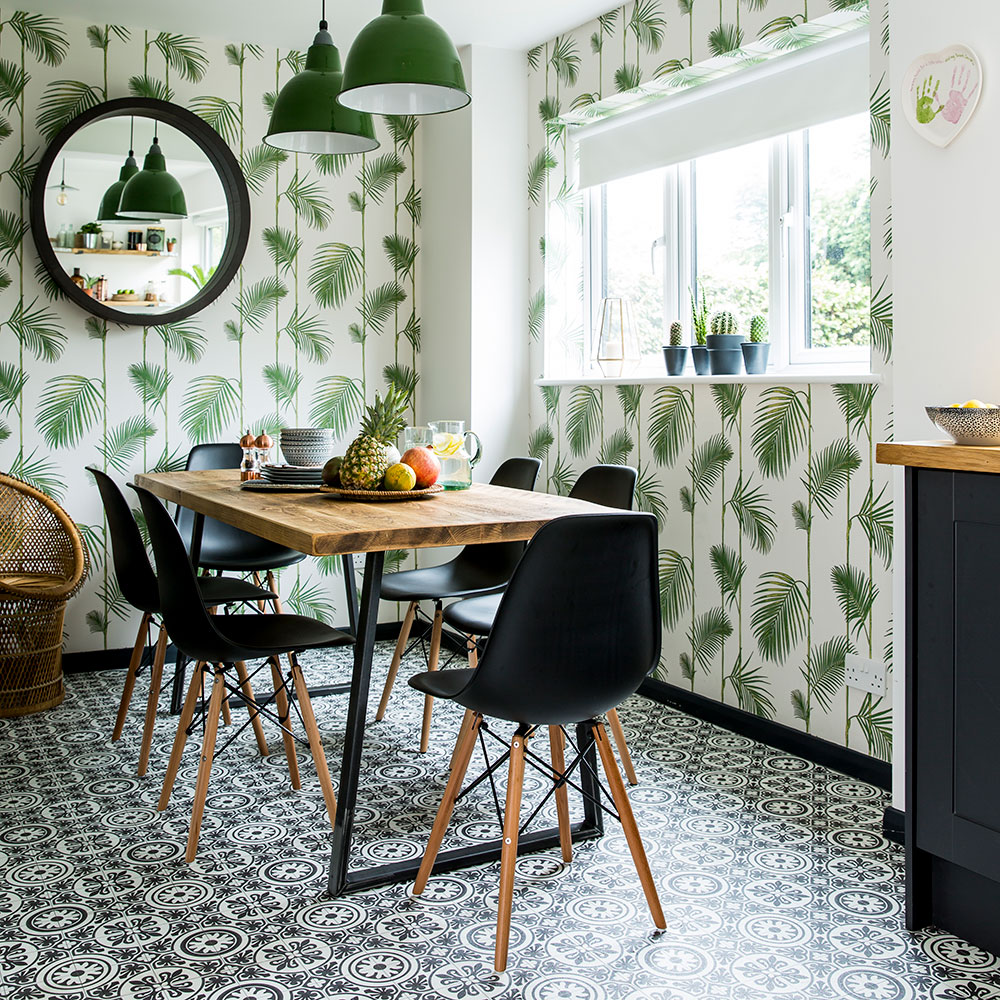
For accurate measuring, Carpetright stocks a wide range of vinyl and offers free home consultations. This including professional measuring so you can buy with confidence.
Quick-Step’s patented Uniclic Multifit system, available at B&Q couldn’t be easier to install. Using a special tongue-and-groove system, the vinyl planks are laid with a single ‘click,' with no need for adhesive.
B&M’s self-adhesive vinyl tiles start from just £3.99 per sq m, so there’s no excuse not to give your cloakroom ideas a refresh! For something funky, check out the Bewley Vinyl, shown above.
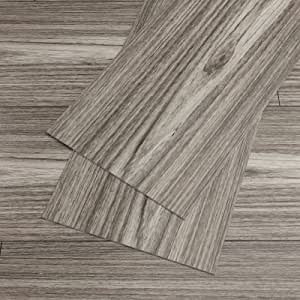
These self-adhesive floor tiles are super easy to install yourself, making them a great budget-friendly option. Creating the effect of grey wood, they'd look good in any room, but they are waterproof, making them ideal for the kitchen and bathroom.
How do I fit vinyl flooring myself?
Sheet vinyl can be cut with a Stanley knife and is pretty easy to fit in a standard room. Vinyl tiles are installed similarly to ceramic tiles and many come with click-fit edges. Versions that don’t require wet adhesive are cleaner and quicker.
'Click system tiles and planks are relatively straightforward for the determined DIY enthusiast,' says Steve Urwin, Tarkett. 'The most important thing is to get the sub floor ready – a perfectly smooth and level surface to start with is much more likely to give the best finish. If the subfloor cannot be completely perfect then it’s best to choose a heavier click tile with a foam backing or a sheet floor with textile backing.'
There are plenty of step-by-step fitting tutorials on YouTube, but make sure you have the right equipment before you start (a utility knife, measuring tape, the vinyl itself, a ruler, and an adhesive). Clean and prepare the sub-floor first, then start with measurements and planning.
'Consider all irregularities, obscure angles, and corners, as well as any potential obstacles,' says Richard Mann, Founder, Premier Porcelain. 'I recommend starting from the longest straight wall in the room. Start cutting the vinyl after acclimatising it to room temperature and install it with the adhesive without leaving any air bubbles. Finally, give enough time for the flooring to set and cure.'
How do I clean vinyl flooring?
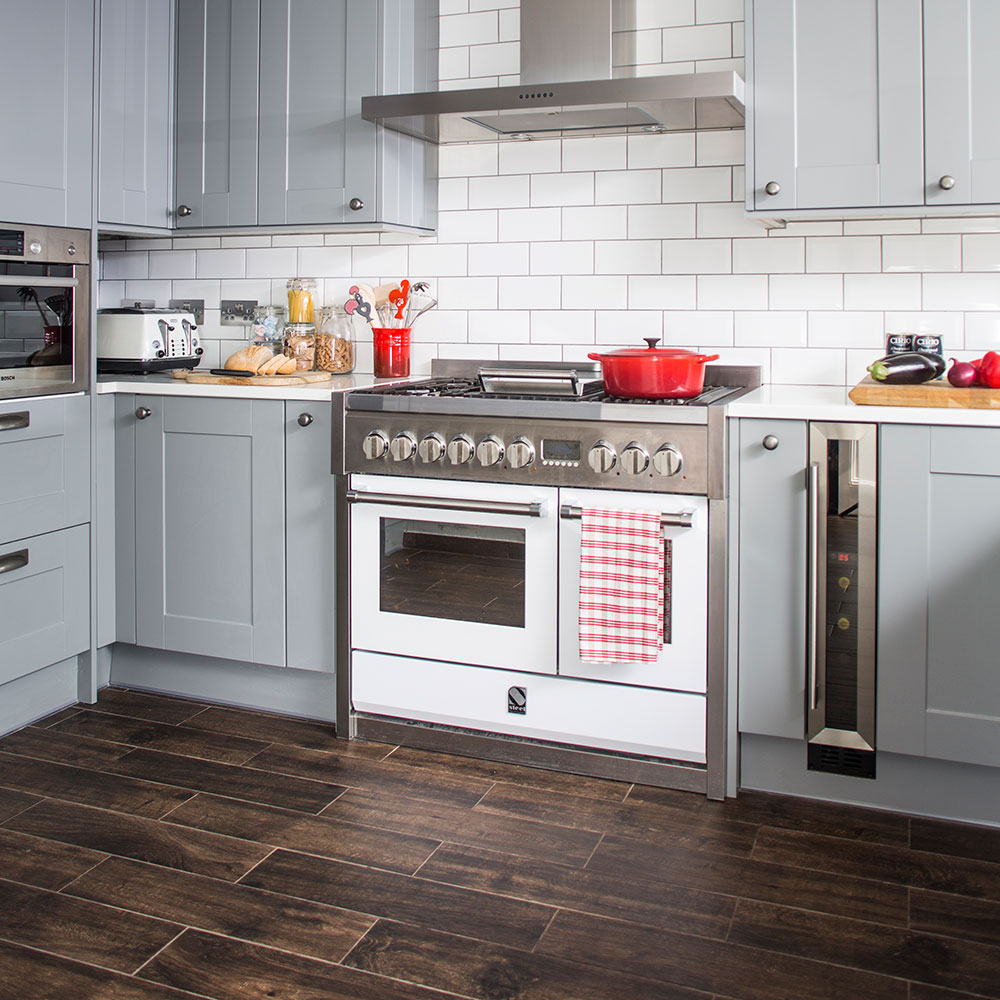
Cleaning vinyl flooring is thankfully easy, and it's one of the easier floor types to maintain. Use one of the best vacuum cleaners to remove any loose dirt and debris, and then use a mop with warm water and mild detergent.
'Don't use abrasive cleaners or anything with bleach on vinyl flooring as they can damage the surface,' Richard says. 'Make sure to use a clean and dry mop to remove excess moisture when you’re done cleaning.'
Look for a vinyl-safe floor cleaner, like the Rejuvenate Luxury Vinyl Floor Cleaner, £18.99 at Amazon. This will remove any stains without damaging the surface.
Heavy furniture can create indentations in vinyl so use felt or rubber covers on chairs and casters if you can. Never drag heavy furniture across vinyl as it may scratch or dent the floor.
FAQs
Do you put underlay under vinyl?
Whether vinyl flooring needs underlay depends on the type of vinyl and the subfloor's condition.
'Underlay can provide comfort, insulation, and sound reduction, but in some cases, it's not necessary,' says Andhi from MyProsAndCons. 'If you're laying sheet vinyl over a smooth, well-prepared subfloor, you might not need underlay. But if you're using luxury vinyl tiles or planks over a hard subfloor, an underlay with soundproofing and moisture barrier properties could be beneficial.'
The most important thing is that your floor is completely level before you apply vinyl. Most types of vinyl will glue down smoothly and permanently, so a underlay isn't necessary if you've already got the perfect base.
What is the disadvantage of vinyl flooring?
Vinyl flooring offers a wealth of advantages, like being cheaper than tile and wood, being naturally waterproof and easier to clean. There are a couple of potential drawbacks to keep in mind though.
'Like laminate, vinyl is a printed flooring and so the pattern may well repeat in the room, meaning you’ll see the same feature in different areas,' says Steve from Tarkett. 'Some cheaper offers can also look a bit shiny & artificial.'
'Vinyl may not be great if your subfloor is not in a good condition as it may show up any lumps and bumps in your floor,' says Johanna Constantinou, Brand and Communications Director, Tapi.
'Vinyl also doesn’t stand up well to heavy loads and can be damaged by sharp objects,' adds Christian Roberts, Flooring Expert, Myjobquote.co.uk. 'Also, with exposure to direct sunlight, colours can sometimes fade.'
Now you know everything there is to know about vinyl flooring, will you be upgrading your floors?

Amy Cutmore is an experienced interiors editor and writer, who has worked on titles including Ideal Home, Homes & Gardens, LivingEtc, Real Homes, GardeningEtc, Top Ten Reviews and Country Life. And she's a winner of the PPA's Digital Content Leader of the Year. A homes journalist for two decades, she has a strong background in technology and appliances, and has a small portfolio of rental properties, so can offer advice to renters and rentees, alike.
- Katie SimsContributor
-
 Will a conservatory add value to your home and how can you maximise it?
Will a conservatory add value to your home and how can you maximise it?This is what the pros say
By Amy Reeves
-
 I’ve been looking for a new signature scent for my home and The White Company's new fragrance is the exact summer holiday smell I needed
I’ve been looking for a new signature scent for my home and The White Company's new fragrance is the exact summer holiday smell I neededSantorini smells fresh, summery and sophisticated
By Kezia Reynolds
-
 How to remove algae from garden walls in five steps – and the cleaning product experts rave about for tackling it fast
How to remove algae from garden walls in five steps – and the cleaning product experts rave about for tackling it fastExperts share their top tips for getting garden walls algae-free
By Katie Sims
